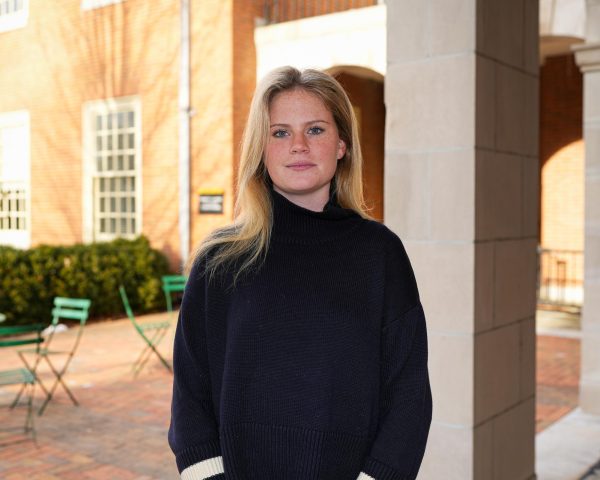
It is a Saturday night in 2004, and a crowd of kids are gathered in Pugh Auditorium for the premiere of a student-led production. Seven club baseball players are seated in the front row, clad in their finest suits and eagerly awaiting the screening of their big break. A brown-haired junior approaches the podium and hits play.
For two hours the audience is transported into a comedic portrayal of the uncensored lives of Wake Forest students. When it concludes and the closing credits roll, Will Allegra — among his seven talented teammates — is listed as the major contributor to the creation of the film. Now twenty years later, his name is listed under various Producer roles such as “The Lego Movie,” 21 and “22 Jump Street,” “Spider-Man: Across the Spider-Verse” and “The Mitchells vs. The Machines.”
Allegra revisited his Alma Mater on Sept. 12 where he spoke to an auditorium of film students regarding his journey in the world of cinema. He recounted his career, starting with his passion for the art form manifesting as early as secondary school.
“It hit a point in high school when every time we were assigned an essay I would try and talk the teacher into letting me make a video instead,” Allegra said.
At Wake Forest University, Allegra received a communications degree with a focus in film and media studies. After college, he sought to take his education to the heart of cinema: Hollywood. “I packed up the car and drove to LA, without a plan or a job and knowing only one family friend whom I hadn’t seen in 15 years,” Allegra said. “When I got there, and was looking at all the billboards, I started thinking ‘Oh no, what did I do? I don’t have a plan or a job.’”
Without credentials, Allegra managed to land a job as an assistant to a talent agent where, several years later, he advanced to his first onset experience working as an assistant director on a film titled “21 Jump Street.”
He notes one of his proudest accomplishments was his contribution to the critically acclaimed ending of “22 Jump Street,” considered by many to be “the best end credits sequence.”
“When creating a film, you have to always consider, ‘what is going to resonate with the audience?’” He added, “We knew the franchise was coming to a close and our original ending reflected that. But when we showed it to an audience they left the theater disappointed by the concept. So in a month, we cataloged every sequel idea we could come up with.”
When questioned on two of his major motion pictures, he describes the process of creating an animated film as first, considering what the heart of the movie is and what relationships you want to build around it. For him, the “Lego Movie” was, at its core, an ode to the creativity of children.
“There are all these kids in their basements making stop-motion animated brick films,” Allegra said. “How do we make a movie and celebrate the idea that it doesn’t matter if you’re a kid or Michael Bay; everyone can be a storyteller?”
“Spiderman: Across the Spider-Verse” was constructed similarly, with the objective being to create an animated movie that would celebrate the heritage of the Spiderman comics while incorporating the different generations and manifestations of the superhero.
The conversation with Allegra was mediated by Cagney Gentry, a communications professor and member of Wake Forest’s class of ‘06, and is the first of the newly implemented critical and creative media master class series. This face-to-face was Wake Forest’s first step toward expanding its film and media curriculum by bringing in alumni and other esteemed professionals to speak to students regarding a career in cinema and other media forms.
Professor Gentry expresses his ambitions for the master class series: “I feel like there’s a lot of pressure on the here and now, so you can get the best job once you graduate. I want the students to realize that these people’s paths are more circuitous than that. To find a path to success — whatever that means to you — is not always a direct line.”
“The film industry looks very different today than it did five years ago. There’s such an emphasis on packaging,” Allegra said. “Having a great script is not good enough anymore, you also need a director attached and some talent.”
Despite this hurdle, Allegra is currently working on over a dozen projects — including a sports comedy, a documentary about an alien abduction, a romcom, a murder mystery that takes place in a retirement home, an adult fairy tale, an action comedy and an R-rated bigfoot movie — many of which I’m confident we’ll be getting tickets to see at a/perture in Winston Salem in the near future.
Finally, when asked for advice for anyone aspiring to work in the entertainment industry, Allegra suggests that we keep creating.
“Just make stuff. Write scripts. Or make shorts,” Allegra said. “The first few tries are guaranteed to be bad, but each time you’ll get a bit better and then one day you will make something great and hopefully get the recognition you’re seeking. It’s true, the business has gotten harder but the barrier to entry to make stuff has gotten lower. Thankfully, everyone has a professional film studio right here (motions to his iPhone).”










